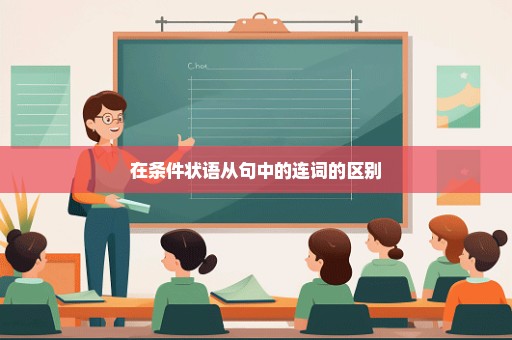在条件状语从句中的连词的区别
条件状语从句
通常由以下连词引导:if,
unless,
on
condition
that,
suppose,
in
case(如果,万一),
as
/so
long
as(只要)等
如:
①If
you
are
thirsty,
water
far
away
can’t
help
you.
远水不解近渴。
②So
long
as
we
do
not
divorce
ourselves
from
the
masses,
we
are
certain
to
be
victorious.
只要我们不脱离群众,我们就一定会胜利。
③You
can’t
expect
the
reception
to

be
clear
unless
the
radio
set
is
properly
tuned
it.
如果不把收音机调好,你不可能指望收到清晰的播音。
④Suppose
we
can’t
get
the
necessary
equipment,
what
shall
we
do?
假设我们弄不到必要的设备,那我们怎么办?
⑤We’ll
let
you
use
the
room
on
condition
that
you
keep
it
clean
and
tidy.
我们可以让你们用这个房间,如果你们能保持整洁的话。
⑥Send
us
a
message
in
case
you
have
any
difficulty.
万一有什么困难请给我们一个信。
unless作连词,表示“如果不”,“除非”,在意义上等于if…not,
在有些场合主要是指真实条件句,它引导的肯定式的条件状语从句可以和if引导的否定式的条件状语从句互换。
如:Unless
you
change
your
mind,
I
won’t
be
able
to
help
you.
=
If
you
don’t
change
your
mind,
I
won’t
be
able
to
help
you.
除非你改变你的想法,否则我不能帮助你。
unless不可用于假想的事情,因此,当if…not引导非真实条件状语从句时,一般不可改用unless.
如:
If
she
weren’t
so
silly,
she
would
understand.
如果她不那么傻,她就会懂了。
if any ,if so ,if anything 的区别和用法。
时间状语从句(1)常用的连词有when, while, before, after, until(till),since, as soon as等。
(2)时间状语从句中一般不用将来时,若谈论将来的事情,往往用一般现在时代替,
如:I’ll go on with the work when I come back tomorrow./As soon as he finishes
the work, he will come to see me.
(3)when和while都表示“当……的时候”,但有区别。
when强调“特定时间”,如:
There was a loud knock at the door when he was just falling asleep.
while表示的时间是一段,而不是一点,如:
While he was having supper, he heard someone knock at the door.
while有时还有对比的含义,如:
While I was reading, he was writing.
2.原因状语从句(1)常由because, since, as引导。
(2)because表示直接的原因,着重点在从句,用于回答why,语气最强。
I can’t go to school because I am ill.
since一般表示对方已知的,无须加以说明的既成事实的理由,全句中心在主句,语气比because弱,常译为“既然”,如:Since you are ill, I’ll go alone.
as表示十分明显的原因,一般说明因果关系,着重点在主句,语气较弱。常译为“由于”,如:As it is raining hard, we won’t go hiking.?
for是个并列连词,只能放在另一个并列分句后面,表示一种推理或解释,或用作附加说明,而不是指理由或原因,语气最弱,一般不放在句首,常译成“因为”,如:You haven’t met him, for he didn’t come here.
3.条件状语从句
常由if(假如、如果)No matter(不管)来引导,如:No matter what he says,I won’t believe him,如果主句是一般将来时,从句往往用一般现在时来表示将来,如:I’ll go for a picnic if it is fine.
4.结果状语从句
一般由so...that, such...that引导,如:It’s such a heavy box that nobody can move it.
The box is so heavy that nobody can move it.
1 if any ------- 明确了范围:
Tom, please lend me a book on the history of China IF ANY
IF ANY==if you have any books of the sort I mention.
2 if anything ------没有明确范围:
Please give me someting to drink IF ANYTHING
IF ANYTHING == if you have anything / if there is anything that I can drink.
3 if so ------指代某个明确的动作:
I - Will Tom come tomorrow?
- I think so.
- IF SO, i Will tell him what I think of his travel plan.
IF SO== if he comes tomorrow
现在你明白了吗?你的问题很有质量,是我碰到的高质量问题之一。
鹏仔微信 15129739599 鹏仔QQ344225443 鹏仔前端 pjxi.com 共享博客 sharedbk.com
图片声明:本站部分配图来自网络。本站只作为美观性配图使用,无任何非法侵犯第三方意图,一切解释权归图片著作权方,本站不承担任何责任。如有恶意碰瓷者,必当奉陪到底严惩不贷!
 百科狗
百科狗



